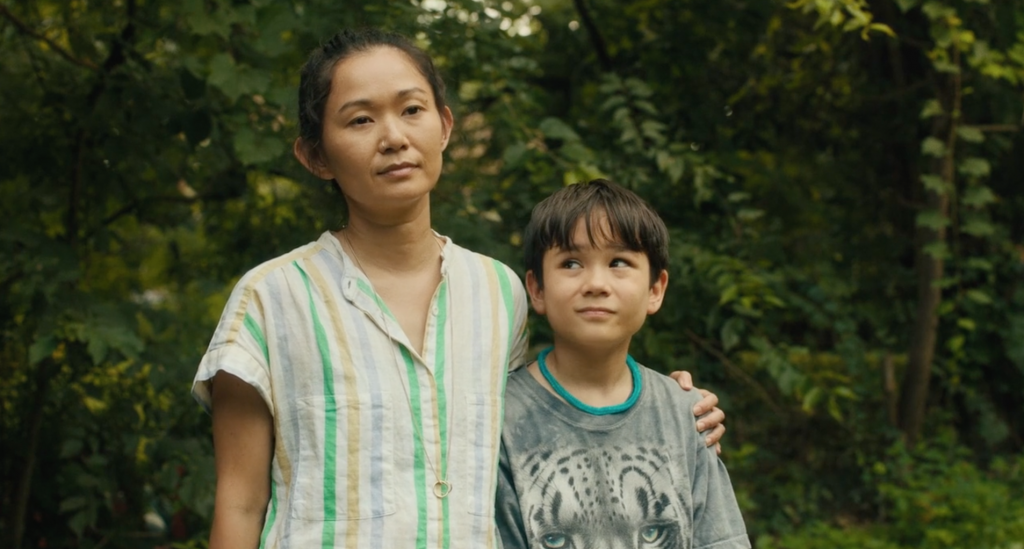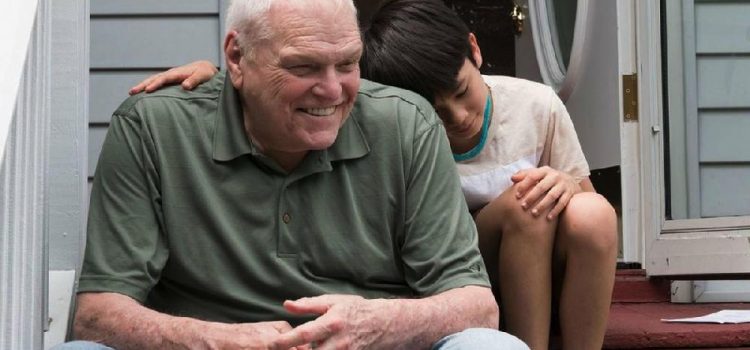By Alex McPherson
Like a Christmas miracle, director Andrew Ahn’s new film, “Driveways,” restored my faith in humanity.
Cody (Lucas Jaye) is a sensitive boy struggling to fit in with his peers. He helps his loving yet overwhelmed mother, Kathy (Hong Chau), clean out his late aunt’s house in a rural New York town to prepare it for sale. Cody meets Del (the late Brian Dennehy), a widowed war veteran living next door, and eventually forms a friendship with him that profoundly impacts both their lives and the lives of those around them for the better.
Sure, the plot sounds exceedingly saccharine, and although “Driveways” follows predictable beats, Ahn’s humanistic approach to the material sets it apart. Viewers shouldn’t expect anything like the bombastic screamfest of “Hillbilly Elegy,” thank goodness, but rather a film that feels like a bittersweet pat on the back.
With a gentle touch that prizes emotional subtlety over heavy-handedness, “Driveways” zeroes in on a few characters who all feel adrift and disoriented in their lives. Cody is lonely and doesn’t seem to embrace the joys of childhood, in need of a friend.
Kathy is processing the death of her sister — who she became distanced from in adulthood — and the responsibilities of caring for Cody as a single, Asian American parent, while also working to become a nurse.
Del is coming to grips with his remaining years and the mistakes made throughout his life, waiting for a figurative sunset to close out his final chapter.
The stage is set for a depressing tale, but “Driveways” isn’t a depressing film — showing these characters’ potential for growth despite their struggles, as well as the meaningful impacts that acts of goodwill can have on their lives, or, in fact, anyone’s life.
The film emphasizes smaller, quieter moments of human connection that feel earned and genuine, with an emotional core that sneaks up on viewers and encourages them to go out into the real world and be compassionate to others.
Much of the power of “Driveways” comes from Ahn’s devotion to letting us sit with the characters and watch them interact in a way that doesn’t feel traditionally “dramatic.”
Indeed, the film progresses in a relatively low-key fashion, with sympathetic characters whose struggles feel relatable, and whose arcs feel earned and thoughtful. Larger topics linger in the periphery— among them prejudice, economic inequality, and the stress of single parenting — but “Driveways” isn’t really concerned with hard-hitting social commentary.
What Ahn’s film spotlights, on the other hand, is how seemingly mundane acts of kindness and reaching out can bring people together, even those with vastly different life experiences.
The actors portraying the film’s small cast are exceptional, helping to make the characters feel like real human beings. Jaye gives an absolutely incredible performance, conveying an emotional range and nuance that would be impressive for an actor of any age.
Chau is also compelling to watch, illustrating her character’s resilience in an emotionally draining situation. The true standout performance of “Driveways,” though, is by Brian Dennehy. Knowing that this performance was among his last gives every scene he’s in an added melancholic weight, especially his final monologue — a mournful, beautiful reflection on life and the importance of cherishing those close to us.
I don’t have a single flaw to nit-pick. “Driveways” is a near-perfect film, one whose simplistic premise and small-scale storytelling belies an emotional wisdom that the world needs right now. Do yourself a favor and go watch it.

“Driveways” is a drama directed by Andrew Ahn, starring Brian Dennehy, Hong Chau, Lucas Jaye and Christine Ebersole. It is 83 minutes long and is available on Showtime and Video on Demand. Alex’s Grade: A+

Lynn (Zipfel) Venhaus has had a continuous byline in St. Louis metro region publications since 1978. She writes features and news for Belleville News-Democrat and contributes to St. Louis magazine and other publications.
She is a Rotten Tomatoes-approved film critic, currently reviews films for Webster-Kirkwood Times and KTRS Radio, covers entertainment for PopLifeSTL.com and co-hosts podcast PopLifeSTL.com…Presents.
She is a member of Critics Choice Association, where she serves on the women’s and marketing committees; Alliance of Women Film Journalists; and on the board of the St. Louis Film Critics Association. She is a founding and board member of the St. Louis Theater Circle.
She is retired from teaching journalism/media as an adjunct college instructor.

